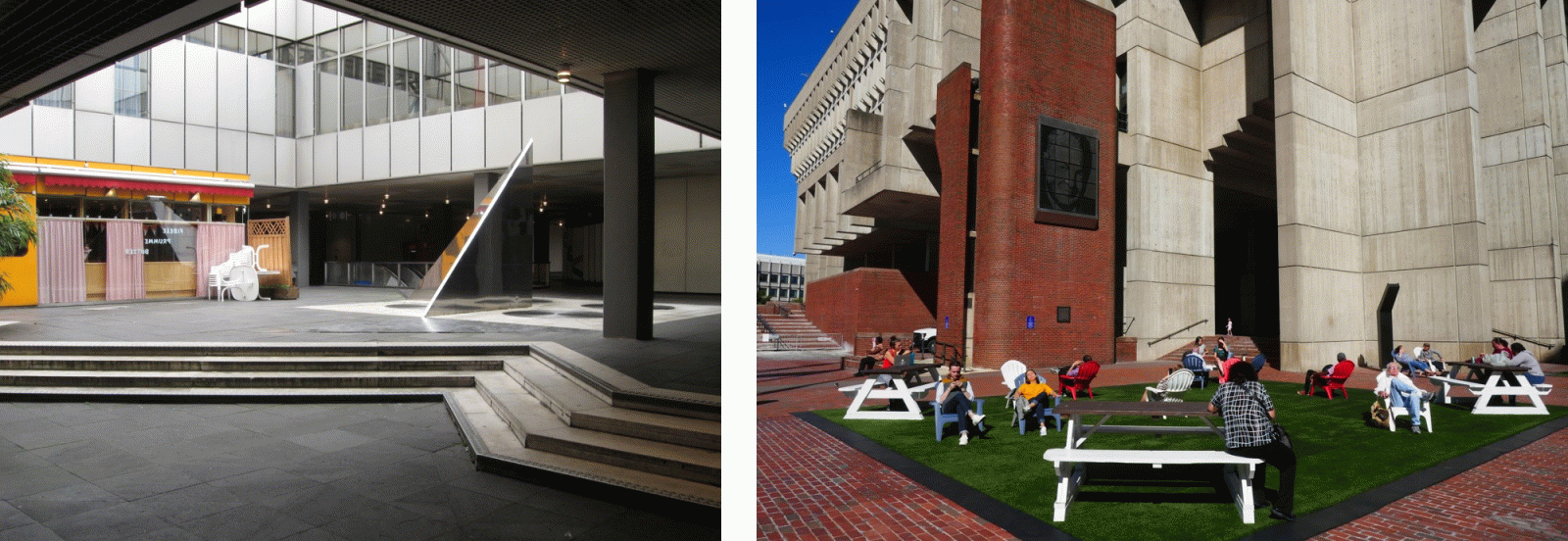KHI 2021+ Lecture Series
Brigitte Sölch: Struggle for Democracy, or: City Halls and the Art of Experience

Boston, City Hall (Photo: NewtonCourt, 2019) and Bonn, City Hall (Photo: Brigitte Sölch, 2017).
The starting point of my lecture—that includes also early modern perspectives—will be the seemingly every day as well as conflictual presence of modern city hall buildings from the 1950s to the 1970s. My aim is to reflect upon the discrepancy between former ideas and visions and the controversies that this architecture arouses today, as it is perceived and discussed by a broader public. Many of these buildings are seen as "failed utopias" or "brutal" and "ugly" architecture, a topic that may belong first of all to the field of heritage studies and preservation, but goes far beyond. For what are 'we' talking about when it comes to city halls? Certainly not architecture alone. But what is our concept of architecture? This question forms part of my ongoing research project "Struggle for democracy or culture of dominance? The Agora in postwar architectural discourse." This addresses the interest in ambichronous phenomena in architecture, the city, and the public sphere. The goal of my lecture is to reflect upon the extent to which art historical research and practices can be part of an "intervening thinking." John Dewey's Art as Experience (1934), among others, will be the basis for further methodological reflections.
Brigitte Sölch is Professor of the History and Theory of Architecture/Design History at Stuttgart State Academy of Art and Design (since 2018) and spent the spring term 2019 in New York City as Weinberg Fellow at the Italian Academy for Advanced Studies at Columbia University (project: "The Agora in Postwar Architectural Discourse"). Her award-winning PhD thesis (published 2007) focused on the beginnings of public museums in Rome in the early eighteenth century, and in 2018, she completed her habilitation at the Humboldt University of Berlin with a thesis on the idea and concept of the 'forum' (fifteenth to twenty-first century). Brigitte Sölch was assistant professor and assistant curator at various universities and museums before holding several positions at the Kunsthistorisches Institut in Florence – Max-Planck-Institute (2008–2018), where she was also co-project leader of "Ethics and Architecture" and "Piazza e monumento." Her forthcoming publications include Kunsthistorikerinnen 1910–1980: Wege Methoden Kritiken, edited with K. Lee Chichester (2021).
This talk is part of the KHI 2021+ Lecture Series, organized by the doctoral and postdoctoral fellows, in collaboration with scientific staff and senior scholars of the Institute. It is envisioned as a forum to reflect on the futures of Art History through conversations with innovative voices in the discipline, working in different areas but sharing methodological concerns.
22 January 2021, 3:00pm
KHI 2021+ Lecture Series
The event takes place online.
Notice
This event will be documented photographically and/or recorded on video. Please let us know if you do not agree with the Kunsthistorisches Institut in Florenz using images in which you might be recognizable for event documentation and public relation purposes (e.g. social media).


